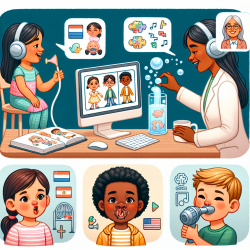As speech-language pathologists, we constantly seek innovative methods to support our young clients, especially those with disabilities. One promising tool emerging from recent research is the iPad. A study titled Improving Learning Outcomes: The iPad and Preschool Children with Disabilities by Linda Chmiliar provides compelling evidence of the benefits of iPads for preschool children with disabilities.
Key Findings from the Research
The study involved eight preschool children with various disabilities using iPads over 21 weeks. Significant improvements were observed in multiple areas, including:
- Shape and color recognition
- Letter recognition and tracing
- Verbalization and self-talk
- Engagement and attention span
Practical Applications for Practitioners
Based on these findings, here are several practical applications for practitioners to consider:
- Incorporate iPads into Therapy Sessions: Use educational apps that focus on areas such as literacy, numeracy, and fine motor skills. Tailor the apps to the child’s interests to maximize engagement.
- Facilitate Parental Involvement: Provide parents with a list of recommended apps and offer workshops to demonstrate how to use these tools effectively at home.
- Monitor and Adjust: Regularly assess the child’s progress and adjust the apps and activities to ensure they meet the child’s evolving needs.
Encouraging Further Research
While the study presents promising results, it also highlights the need for further research to understand the long-term impacts of iPad use on children with disabilities. Practitioners are encouraged to document their observations and share their findings to contribute to the growing body of knowledge in this area.
To read the original research paper, please follow this link: Improving Learning Outcomes: The iPad and Preschool Children with Disabilities.










